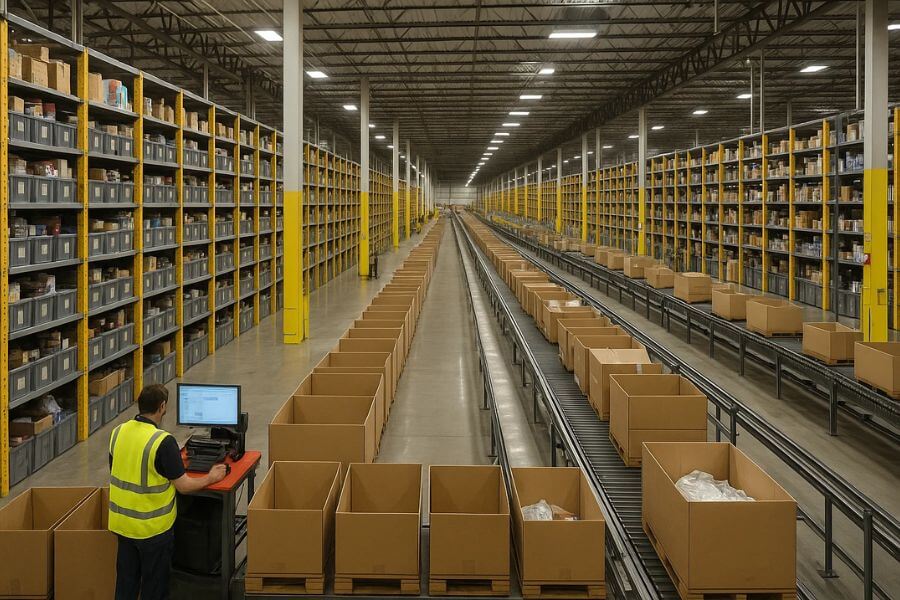The need for a comprehensive supply chain management strategy in the automotive company has long been recognized by executives. They are now facing a new challenge, developing the agility of the automotive supply chain.
What is the Universe of Automotive Supply Chain Management?
The automotive industry today represents a high added value sector. There are many players who interact within this industry: designers, assemblers, parts suppliers, equipment manufacturers, carriers, salespeople, etc.
In the automotive sector, logistics plays a major role at all levels. From design stages, through production to distribution. The sector is characterized by a very strong competitive environment and significant disparities in growth. The sector is also totally globalized.
What is the Challenge for the Automotive Industry? Why an Agile Automotive Supply Chain Management?
Now is the time to take the next step in logistics, to gain market share and maximize efficiency, the supply chain must now be agile.
Agility or Resilience:
Resilience makes it possible to “digest” as quickly as possible a disturbance caused by an external event such as flooding in a factory for example. A resilient Supply Chain helps minimize the impact of a one-off crisis on business results. Agility, on the other hand, will focus on eliminating brakes and sticking points to make the automotive supply chain more fluid in its normal functioning.
Definition of agile Supply Chain:
The agility of the Supply Chain is its ability to return to stable operation after a disruption. For this, it must be able to restore all flows as soon as possible to minimize the degradation of the various performance indicators.
What are the Keys to the Agile Automotive Supply Chain?
The management of the automotive supply chain must be involved in all strategic decisions.
Information sharing across the entire logistics chain:
An agile company is a company that masters its supply chain to be more flexible and more responsive.
The automotive industry naturally requires increased coordination and collaboration between actors. With the main constraint, the sharing of information between these different actors are in real-time!
The need for information includes upstream and downstream flows to expand logistics management.
Reduce sources of vulnerability:
It sounds simple but involves real reflection on all of the company’s activities and management decisions. Is it reasonable to rely on a single supplier in a country with a very unstable political regime? Doesn’t working with several transport companies reduce the risks of interrupting logistics flows? So many questions to ask to ensure the robustness of the logistics chain.
Prepare the organization:
Those responsible for Supply Chain Risk Management should strive to prepare the organization for change. There is no question of wasting time in the reflection in the face of a disturbance, a clear procedure understood by all must allow immediate action. This involves adapting the organizational structure of the company and requires close collaboration between different departments. Likewise, it becomes imperative to develop privileged relationships with customers and suppliers, in particular by sharing the use of numerous data essential for rapid and relevant decision-making.
How to Make the Automotive Supply Chain More Agile?
How can logistics contribute to the efficiency of industrial tools in this context of constant evolution? Here are three ways to gain agility
Overcome the constraints of variations:
As we know, the suppliers of the components of the vehicles are dispersed in the world, for reasons of cost optimization, and therefore in order to assemble the vehicle, it is necessary to gather all these components or raw materials in order to obtain the finished product. Of course, there are variations of raw material orders, depending on the volume targeted in manufacturing, in fact, each time, the type and number of orders change, but the most important thing is that once the order is created by the assembly center, it must be satisfied in quality and quantity, but above all, it is to be able to deliver these raw materials within the agreed deadlines as well. It is at this point that logistics agility will play a key role in managing these constraints of variations.
It is necessary to rely on partners with the appropriate means: the agility of service, mobilization capacity, geographical coverage, management of complex flows. It is also necessary to collaborate with the main actors of the logistics chain as mentioned above, in order to optimize the transport plans and to secure the production of factories at the best cost, by relying on the management tools, and the coordination of intercontinental flows using all transport solutions (road, air, sea, rail).
Benefit from global support:
The automotive industry requires mastery of international flows. Even though the automotive industry is organized on a global scale in the form of regional clusters. We must be able to supply manufacturers and equipment suppliers through the sea, rail, road, and air routes, across the planet while providing visibility, control, and flexibility in the solutions implemented. For example, it is necessary to call a third-party logistics, managing the entire supply chain, from the order to the supplier, while setting up a high-performance groupage service perfectly suited to the constraints of the automotive sector.
Increase productivity:
Regardless of the geographical area, the requirements of manufacturers and equipment suppliers remain the same in terms of productivity. This requirement leads to a capacity for innovation, including in industrial processes, because an automotive manufacturer can outsource the complete management of its supply chain to a logistics party. This service includes order management, optimization of transport plans, assembly of customer components, and delivery of raw materials in total synchronization with the manufacturing chain. In this way, the manufacturer optimizes its flexibility and simplifies its upstream logistics.
This level of integration is only possible through industry expertise and the ability to offer continuous improvement through a LEAN approach and regular reengineering of production processes.
Conclusion
The emergence of new technologies and other disruptors in the automotive components industry requires new and updated processes, in order to meet the challenges, the solution lies in greater agility of the supply chain.











